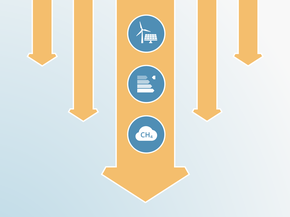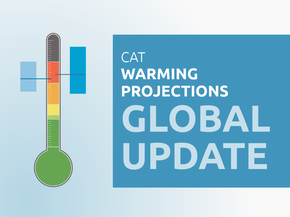Critically Insufficient4°C+
World
NDCs with this rating fall well outside of a country’s “fair share” range and are not at all consistent with holding warming to below 2°C let alone with the Paris Agreement’s stronger 1.5°C limit. If all government NDCs were in this range, warming would exceed 4°C.
Highly insufficient< 4°C
World
NDCs with this rating fall outside of a country’s “fair share” range and are not at all consistent with holding warming to below 2°C let alone with the Paris Agreement’s stronger 1.5°C limit. If all government NDCs were in this range, warming would reach between 3°C and 4°C.
Insufficient< 3°C
World
NDCs with this rating are in the least stringent part of a country’s “fair share” range and not consistent with holding warming below 2°C let alone with the Paris Agreement’s stronger 1.5°C limit. If all government NDCs were in this range, warming would reach over 2°C and up to 3°C.
2°C Compatible< 2°C
World
NDCs with this rating are consistent with the 2009 Copenhagen 2°C goal and therefore fall within a country’s “fair share” range, but are not fully consistent with the Paris Agreement long term temperature goal. If all government NDCs were in this range, warming could be held below, but not well below, 2°C and still be too high to be consistent with the Paris Agreement 1.5°C limit.
1.5°C Paris Agreement Compatible< 1.5°C
World
This rating indicates that a government’s NDCs in the most stringent part of its “fair share” range: it is consistent with the Paris Agreement’s 1.5°C limit.
Role model<< 1.5°C
World
This rating indicates that a government’s NDC is more ambitious than what is considered a “fair” contribution: it is more than consistent with the Paris Agreement’s 1.5°C limit.
Sources
List of references
- ADB. (2013). Bhutan Transport 2040: Integrated Strategic Vision (Issue 1). https://doi.org/10.1007/s13398-014-0173-7.2
- ADB. (2020). Asian Development Outlook 2020 Update Wellness in worrying times (Sept). https://www.adb.org/sites/default/files/publication/635666/ado2020-update.pdf
- Bellini, E. (2020, September 9). Bhutan launches ground-mounted PV tender. PV Magazine. https://www.pv-magazine.com/2020/09/09/bhutan-launches-ground-mounted-pv-tender/
- Department of Engineering Services. (2013). Bhutan Green Building Design Guidelines. www.mowhs.gov.bt
- Dept. Renewable Energy. (2019). Energy Efficiency Roadmap. https://www.moea.gov.bt/wp-content/uploads/2017/07/EE-Roadmap-Final.pdf
- Global Environment Facility. (2017). Bhutan Sustainable Low-emission Urban Transport Systems. https://www.thegef.org/project/bhutan-sustainable-low-emission-urban-transport-systems
- Green Climate Fund. (2017, October 2). FP050: Bhutan for life . https://www.greenclimate.fund/project/fp050#investment
- Gyelmo, D. (2018a). Bhutan to Graduate from Being a Least Developed Country. https://thewire.in/south-asia/bhutan-no-longer-a-least-developed-country
- Gyelmo, D. (2018b). Environment and politics in Bhutan’s elections. The Third Pole. https://www.thethirdpole.net/en/2018/10/10/environment-and-politics-in-bhutans-elections/
- IEA/IMF. (2020). Sustainable Recovery - World Energy Outlook Special Report. International Energy Agency (IEA). https://www.iea.org/reports/sustainable-recovery
- IFC. (2018). Climate Investment Opportunities in South Asia. http://wrld.bg/PgpC30gS88e
- IndiaTimes. (2016). India imports 1,542 MW power from Bhutan.
- IRENA. (2019). Kingdom of Bhutan: Renewables readiness assessment. www.irena.org
- Kuensel. (2018). PDP almost achieved all its environment-related pledges. http://www.kuenselonline.com/pdp-almost-achieved-all-its-environment-related-pledges/
- Ministry of Economic Affairs. (2019). National Energy Efficiency and conservation Policy. https://www.gnhc.gov.bt/en/wp-content/uploads/2019/11/Final-EEC-Policy.pdf
- Ministry of Finance. (2020a). Notification FM/MOF/03/2020. www.mof.gov.bt.
- Ministry of Finance. (2020b). Budget FY 2020-21. https://www.mof.gov.bt/wp-content/uploads/2020/06/BUDGET2020-21.pdf
- National Environment Commission. (2012). National Strategy and Action Plan for Low Carbon Development, 2012. http://www.nec.gov.bt/wp-content/uploads/2020/04/National-Strategy-and-action-plan-for-Low-Carbon-Development-2012.pdf
- National Environment Commission. (2016). Bhutan State of the environment report. www.nec.gov.bt
- National Environment Commission. (2019). National Waste Management Strategy. http://www.nec.gov.bt/wp-content/uploads/2019/10/NWMS-ENGLISH-VERSION_opt.pdf
- Royal Government of Bhutan. (2007). National Environmental Protection Act.
- Royal Government of Bhutan. (2010). Copenhagen Pledge. http://unfccc.int/files/meetings/cop_15/copenhagen_accord/application/pdf/bhutancphaccord_add2.pdf
- Royal Government of Bhutan. (2011). Second National Communication to the UNFCCC. http://unfccc.int/resource/docs/natc/snc_bhutan.pdf
- Royal Government of Bhutan. (2012). Bhutan: In Pursuit of Sustainable Development. https://sustainabledevelopment.un.org/content/documents/798bhutanreport.pdf
- Royal Government of Bhutan. (2015). INDC of the Kingdom of Bhutan. https://www4.unfccc.int/sites/ndcstaging/PublishedDocuments/Bhutan%20First/Bhutan-INDC-20150930.pdf
- Royal Government of Bhutan (RGoB). (2010). Economic Development Policy of the Kingdom of Bhutan, 2010.
- UNDP. (2016). Low Emission Development Strategy for the Transport Sector.
- UNDP. (2018a). Keeping Bhutan carbon neutral. Medium. https://medium.com/@UNDP/keeping-bhutan-carbon-neutral-df239af75369
- UNDP. (2018b, October 1). Bhutan Sustainable Low Urban Transport Systems . United Nations Development Programme. https://open.undp.org/projects/00094488
- UNDP. (2019). Bhutan. United Nations Development Programme. https://www.ndcs.undp.org/content/ndc-support-programme/en/home/our-work/geographic/asia-and-pacific/bhutan.html
- World Bank. (2020a). GDP, PPP (constant 2017 international $) - Bhutan Data. World Bank. https://data.worldbank.org/indicator/NY.GDP.MKTP.PP.KD?locations=BT
- World Bank. (2020b). Global Economic Prospects (June 2020). https://openknowledge.worldbank.org/handle/10986/33748
- World Bank Group. (2017). How much should Bhutan worry about its public debt? https://www.worldbank.org/en/country/bhutan/brief/should-bhutan-worry-about-public-debt
Further analysis
Latest publications
Stay informed
Subscribe to our newsletter




